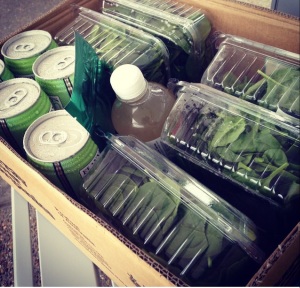When you overhaul your lifestyle or even make gradual changes, the grocery bill tends to sky-rocket. This is not to have a dig at small, sustainable, organic companies or local organic farmers. The way the market is at the moment, they have no choice but to charge their customers extra to ensure that they themsleves make a profit. It does seem unfair that simply filling your body with wholesome foods costs a small fortune.
It’s not all bad news. There are an increasing number of ways that you can eat local, chemical-free foods without it costing the earth. It may mean some small sacrifices and some habit changes, but the benefits are well worth it. Here are some of my favourite tricks.
1. Prioritise your health
If you know that it costs say $80 a week to eat a well-balanced, whole food diet without chemicals or factory farmed meats then make finding that $80 a week a priority. Instead or meeting for coffee at a cafe, invite your mates round for a homemade cup of tea (great way to show off a cute, fancy teapot) or even better suggest that you all go for a walk instead. Instead of going out to a restuarant or ordering a takeaway, dine in but make it special. Put a picnic rug on the floor, light candles, put some essential oils in the diffuser and play your favourite tunes. It needn’t be a fancy meal, just something quick and creative using what you have in the fridge/pantry – also an innovative way to reduce waste. Also other small things that we may not even consider are how much we drive (petrol just inhales your money) – could we walk instead or catch public transport? Those sales that pop up in our inboxes or that we happen to walk past when running errands – if you didnt “need” it before it was on sale, you probably don’t need it now, even if the price tag is reduced.
New Habit: Do your weekly grocery shop before you spend money anywhere else (unless it is another necessity like a bill – probably a good idea to avoid a late fee right?). If you have leftover money in the budget to indulge then by all means go for it, or alternatively consider saving it for a rainy day and dine-in just for the fun of it (did I mention that dining-in can involve pyjamas, no make-up and untidy hair?)
2. Cut costs in other ways
I know that I am guilty of forgetting that those long, indulgent hot showers come at a cost (literally) and that electricity doesn’t grow on trees. All these bills add up and so looking for fun and creative ways to minimise your energy use can be a great way to save those pennies for more functional purposes (like buying good probiotic capsules). Turn the computer off when you aren’t using it and likewise, don’t just use the television as background noise, commit to watching it or switch it off. Turn off lights when you don’t need them (this is such a huge pet peeve of mine – if I’m not in the room the light is off, simple).
New Habit: As a family, couple, group of roomies, whatever your housing situation, brainstorm more ways to reduce the overall power and water bills each month.
3. Buy the cheap cuts of meats
Have you noticed that organic chicken legs cost less per kilo than conventional chicken breasts? Or that organic lamb forequarter chops are a fraction of the cost of a factory-farmed ‘premium’ steak? Supermarkets and butchers sell animal bones (the most nutritious parts) for dirt-cheap prices. If you eat meat (like I do – sorry vegans, I’m someone that feels better with some quality animal protein and fat in my diet) then get around these sustainable cuts. Chuck them in the slow cooker and not only do you get tender, melt-in-your-mouth meat but you also get a rich and nourishing broth in the process. I’d even go as far as saying once you hop on the slow cooker and bone broth bandwagon you will wonder why you ever paid top-dollar for lean steaks and skinless poultry in the first place.
New Habit: Invest in a slow cooker – they actually are a very reasonable price and start buying cheaper cuts of high quality meats. Also pad the meal out with plenty of veggies as this helps to stretch the meat component oit across several meals.
4. Change your thinking
Okay so technically this isn’t about saving money, but you know me, I’m all about perspective. The reason that we think organic food is expensive is becuase we have comparisons. Of course an organic pear will seem ridiculosuly overpriced compared to it’s conventional cousin. Have you ever had a conversation with someone a few generations older than you about the cost of living. What you and they consider to be reasonable is probably quite different. At middle school I thought that paying $2 for a 250ml chocolate milk was reasonable because if I bought the same thing at a deli it would be $3.50. Mum thought this was ridiculous because she could buy the 375ml ones at uni (back in the day) for $1. So you see it’s all about perspective.
If you consider that by paying extra you are avoiding chemicals, factory farming, animal torture, the cost of industrial machinery (and all that is bad in the world) and in the process supporting a local farmer and his family then it doesn’t seem so bad does it? I know I’m probably bias, because I am currently high on life from the amazing energy I feel, now that I have finally found a diet that works for me, but I would rather spend my money on eating well than on clothes or festical tickets any day.
New Habit: Re-think the value of your health and pay attention to the increase in energy you experience by eating better. Perhaps you even find your paying less in medical bills or for preventative medication in the process. Thanks to ditching chemicals and eating better quality foods I have put my autoimmune disease into remission and a muscle off all medications!!!
5. Buy what you need (and only what you need)
I love health food stores and local markets. The vibe, the like-minded company and the new and exciting products. However they can also be dangerous places for shoppers on a budget (anyone that has become addicted to coconut yoghurt will know what I am talking about – it’s amazing stuff but it’s like paying for gold). Have a list and stick to it. I’ll buy my veggies, fruits, meats/fish/eggsand then extras such as coconut water and then dry goods (spices, herbamare, raw cacao, vanilla bean etc. as I need them). That’s it. Every week I see new items that temp me like you wouldn’t believe. Just the other day I walked past a stall selling raw raspberry cheesecake and then straight away another stall with fresh cacao granola and my favourite raw chocolate mousse. I have learned though that these are things that I don’t need, or even really want when I think about it. I mean if I were to have the granola then I wouldn’t be having my favourite green smoothie and if I were having the cheesecake I’d be forgoing my favourite pumpkin custard (both of which are cheaper to make I might add)
New Habit: Shake of those sneaky temptations and consider whether you actually need a product or whether you can make it cheaper at home (I know that raw chocolate mousse is literally banana, avocado and raw cacao, I just get sucked in by the fact that it’s sitting there all prepared and looking pretty – decorated in nuts, seeds and berries).
6. Shop Local and Seasonal
One final hint that seems to be making its way around the place at the speed of light is to shop seasonally and locally. Now this may not be possible for everyone. Geographically it might be too difficult or perhaps time just doesn’t allow – farmers markets aren’t exactly on at times that are convenient for everyone.
If you can, shop at the source to save on tranportation and packaging costs. If you don’t mind parting with seasonal specialties (like abstaining from winter veggies in the summer and summer fruits in the winter – easier said than done I know) then try to eat with the seasons (the more abundent the produce, the less it costs to produce and the less it is for the consumer).
New Habit: Shop at the local market at least once a month and try to eat as close with the seasons as you can. If you don’t have access to a market then look for locally produced foods at your local green grocer or supermarket. If you have the means (or just prioritise right) you could consider ordering farmers boxes of local, seasonal produce straight to your door. An extra challenge could be to investigate local groups that band together to buy in bulk (a quick google search should do the trick). The idea is that you buy so much that you get an amazing bargain and then the group divides the goodies up among themselves in an equal fashion – a bit more effort but if you really want to save it may be worth the time.
But above all else, the most important thing to understand is that I’m not putting this information out to make you feel guilty or like what you do at the moment is ‘wrong’. I am in no way, shape or form perfect, and really very few of us are 100% of the time (those that are I take my hat off to you, or at least I would if I was wearing one as I type). I persoanlly just do the best job that I can and try as much as possible to keep costs in perspective and prioritise my health above additional expenses. None of the changes I made happened overnight, and most of the people you see out there walking the walk and talking the talk will say the same thing. So move at your own pace and find what works for you, your lifestyle and your own individualised needs. There is no magic formula and I only make suggestions that I have found personally work for me.
So as my one of my idols, Cyndi O’Meara would say,
Happy Changing Habits
How do you eat well on a budget? Do you sacrifice anything, find sneaky bargains, grow your own, all of the above? Let me know





